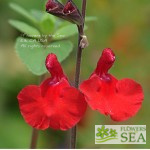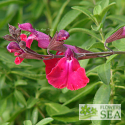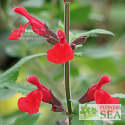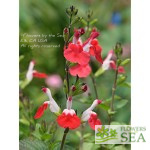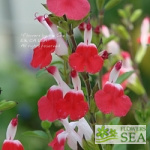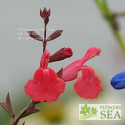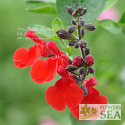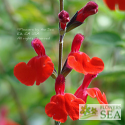(Killer Cranberry Mountain Sage) Masses of magenta flowers on tall spikes lure honeybees and hummingbirds to the rich nectar of Salvia microphylla 'Killer Cranberry'. Its prolific flowers are a killer attraction for people too.
This is a long-blooming, drought-resistant plant with dense, fragrant foliage. Its small, glossy green leaves are veined and have finely serrated edges. Killer Cranberry is a lush choice for dry gardens, but likes average watering based on local conditions.
Mountain Sages are fragrant, heat tolerant and drought resistant. Sometimes they're confused with their close relative Autumn Sage (Salvia greggii). Although they look similar from a distance, up close you can see that S. greggii has tiny, completely smooth leaves.
Whereas Salvia greggii is native to Texas and northern Mexico, Salvia microphylla is native to the American Southwest and a number of Mexican states. In the U.S., it grows best in areas with mild winter temperatures.
California's Monterey Bay Nursery (MBN), which introduced Killer Cranberry, has a killer style when it comes to creating popular names for Salvias. It's the birthplace of the popular Berkeley series of Mountain Sages, all of which MBN developed from the 'Berzerkely' clone. These include the Berkeley Barb, Flower Child, People's Park and Telegraph Avenue cultivars.
At FBTS, we pride ourselves on obtaining the best new Salvias on the market and that includes Killer Cranberry, which is a compact subshrub -- meaning that it's a shrub in warmer climates and an herbaceous perennial that dies to ground in chilly winter areas.
Give it full sun to partial shade and well-drained soil. Salvia microphylla 'Killer Cranberry' is an ideal groundcover, because it spreads easily without being invasive. You can also use it as a border or container plant.
Mountain Sages are the focus of research for their potential use in insecticides as well as medicines. Their plant chemicals contain antioxidant qualities and decrease gastrointestinal absorption of fats. We particularly appreciate them for being easy-to-grow, pretty plants that appeal to tiny wildlife but not to deer.
Question?

